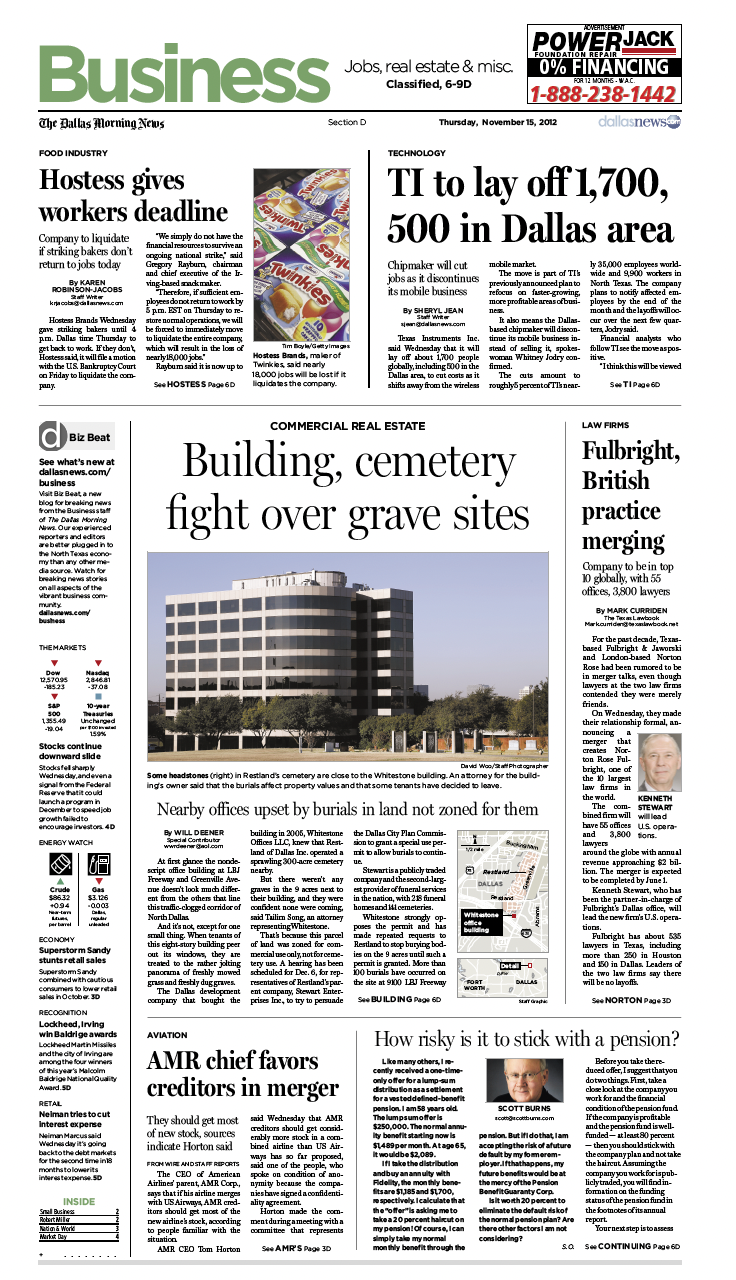Fulbright & Jaworski was the biggest of the Big Three in Texas.
For most of the past century, Fulbright, Baker Botts and Vinson & Elkins reigned as the masters of corporate law in Texas. Lawyers at the trio didn’t need to do much business development because clients rushed to their offices when they needed big-time help. With a few exceptions, New York, Chicago and California law firms were mostly unsuccessful in their attempts to open or grow branch offices in the Lone Star State.
A dozen years ago, Fulbright and her two sister firms — all headquartered in Houston — represented Texas’ biggest businesses and wealthiest citizens. Each employed about 700 attorneys, and they reported roughly the same revenues and profits. The best students at all the Texas law schools prayed one of the Big Three would extend them an offer. Lawyers joined Fulbright and stayed until they retired. Even as national law firms dipped their toes in the Texas legal market waters, leaders at the Big Three swore they would never merge. Texas forever.
And then came Nov. 14, 2012.
The Texas Lawbook issued a breaking news bulletin exactly 12 years ago today: “Fulbright & Jaworski and Norton Rose to Merge.”

Months and months of secret merger negotiations between Fulbright, a firm founded in Houston in 1919, and London-based Norton Rose became public. Combined, the new global mega-firm boasted 3,800 attorneys in 55 different offices, more than $2 billion in revenues and a whole new way of operating a legal partnership.
The news of the global law firm merger stunned the Texas legal and business communities. Fulbright was a Texas institution, the home of legendary Watergate special prosecutor Leon Jaworski, with more than 500 attorneys in Dallas, Houston and Austin. Fulbright partners chaired nonprofit organizations, led fundraisers for charities and headed bar association and chamber of commerce committees. There were immediate worries that a firm as prestigious as Fulbright would suddenly disappear or even slowly fade — the way AOL vanished after its merger with Time Warner or the way the name Continental Airlines was eventually scrubbed out by United Airlines.
There had been previous law firm mergers — Dallas-based Hughes and Luce merged with K&L Gates in 2007 — but legal industry analysts described the Fulbright combination with Norton Rose as groundbreaking and evidence of a dramatically changing Texas legal market.
“Fulbright & Jaworski was the biggest brand in Texas legal history,” said Kent Zimmermann, a law firm consultant at Zeughauser Group. “It was a giant of a law firm — the biggest in Texas and one of the top five biggest in the U.S. Everyone was stunned. But there were partners at Fulbright who clearly saw big changes on the horizon in the Texas legal community and they were right.”

Leaders at Fulbright quickly explained their strategy and promised the name Fulbright would never disappear.
“We are the same law firm with the same integrity and the same quality serving our clients but on an expanded global basis,” Kenneth Stewart, who was then Fulbright’s partner-in-charge of its Dallas office, said in an interview with The Texas Lawbook on Nov. 14, 2012. “This is a smart combination of two groups whose geographic presence, capabilities and client service cultures are strongly complementary.”
A dozen years later, it is evident that the worries were clearly misplaced.
The Fulbright name is stronger than ever in Texas and its lawyers are even more embedded in the community, serving as presidents of bar associations and Inns of Court and high-profile nonprofits.
Texas Lawbook 50 data shows that Norton Rose Fulbright has flourished. The firm ranks in the top five for lawyer headcount and total revenues in Texas and has been on a significant hiring spree in 2024. Lawyer headcount is up by more than 50 attorneys to more than 850 attorneys in the U.S. In Texas alone, Fulbright has grown from 375 attorneys in 2023 to 426 now, including 129 in Dallas.
Revenues generated by the firm’s Texas lawyers were up nearly nine percent last year, to $403 million. Firm leaders say they are on pace for another nine percent in revenue growth in 2024. Since the 2012 merger, revenues per lawyer are up nearly 50 percent — from $740,000 in 2012 to $1.1 million in 2023.
“We are enjoying another really busy year across so many of our practices,” Jeff Cody, a partner in Norton Rose Fulbright’s Dallas office and the firm’s global managing partner, told The Lawbook in a recent interview. “The projects team, with its highly regarded renewables lawyers, continues to be involved in large and innovative transactions. Our IP disputes team is in high demand, particularly for their work with technology patents. And our litigation group remains a focus of the firm, with the new Houston Business Court presenting many opportunities for clients.”
In 2017, Norton Rose Fulbright acquired Chadbourne & Parke, giving the firm increased corporate transactional expertise on the East Coast.
“Both combinations have far exceeded my expectations,” Cody said. “We still see the direct benefits. Revenues are up. Productivity is up significantly. Our attrition rates are low. Our lateral recruiting is strong and it is global.”

“We attract clients and work from clients that we would not have except for the combination with Norton Rose,” he said. “The day the combination took effect, we became one of the five truly global law firms in the world.”
Cody agrees that law firm mergers, especially huge global combinations like the one with Norton Rose, are complex and take time to see results.
“Just addressing the day-to-day issues and the newness and the change can be difficult,” he said. “The real challenge was putting people together, making connections. We are in a people business, which requires building relationships with your partners.”
Cody said that another major challenge is “retention after a merger.”
“It is a big deal because folks are naturally going to be nervous,” he said. “In my mind, you have to be as transparent as you can be. You have to communicate with everyone, especially your partners. If you don’t make people comfortable with the changes, they will be unhappy and they will look to leave.”
Cody dismisses the idea that the institution known as Fulbright & Jaworski vanished in 2012.
“I don’t accept that Fulbright & Jaworski disappeared,” he said. “Yes, the name is different. But the traditions and ethics that Mr. Jaworski brought to the firm are still with us today.”
In the years that followed, more Texas firms merged with out of state operations. Andrews Kurth merged with Hunton & Williams. Gardere combined with Foley. Strasburger & Price became Clark Hill. Thompson & Knight merged with Holland & Knight. And most recently, Locke Lord combined with Troutman.
“There are definitely going to be more law firm combinations in Texas,” Cody said. “We and other firms are always looking for opportunities to grow and make ourselves stronger.
